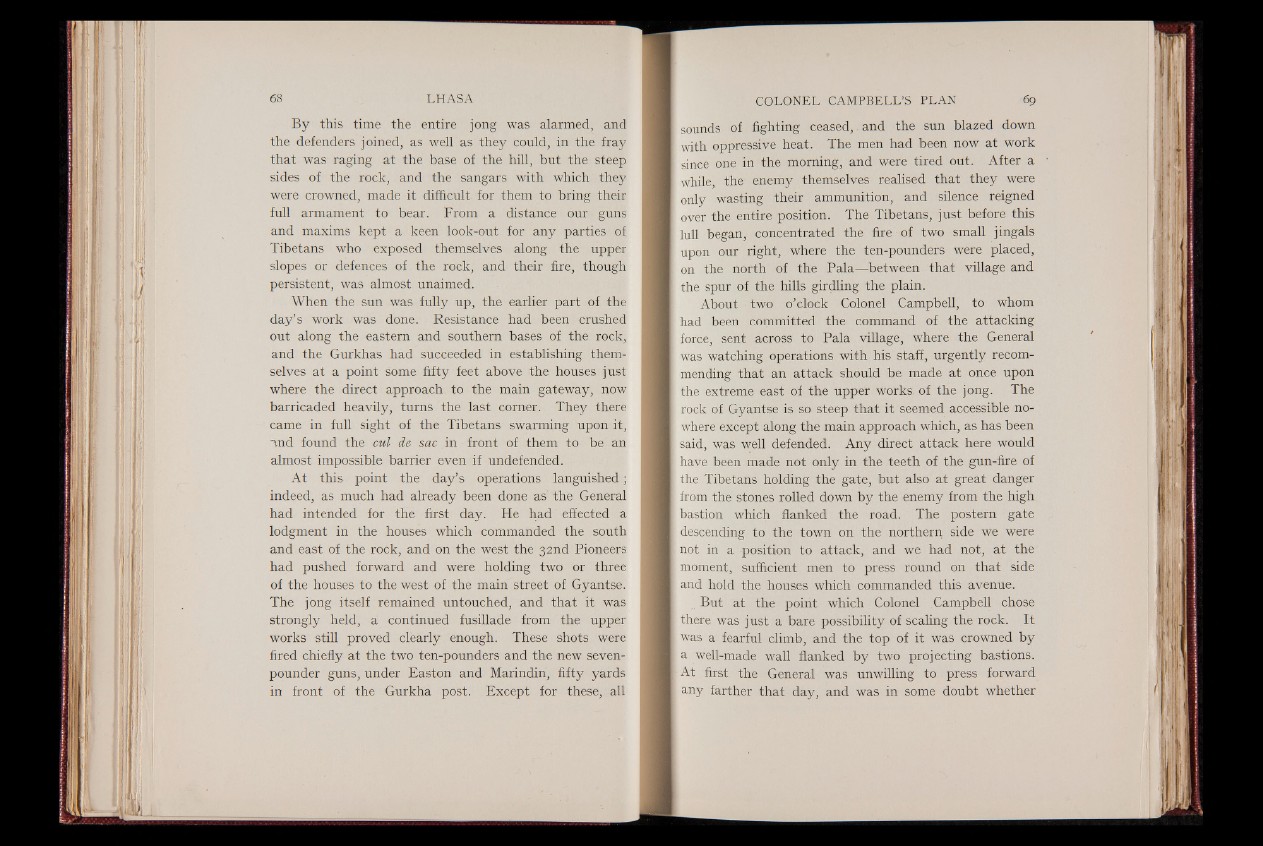
B y this time the entire jong was alarmed, and
the defenders joined, as well as they could, in the fray
that was raging at the base of the hill, but the steep
sides of the rock, and the sangars with which they
were crowned, made it difficult for them to bring their
full armament to bear. From a distance our guns
and maxims kept a keen look-out for any parties of
Tibetans who exposed themselves along the upper
slopes or defences of the rock, and their fire, though
persistent, was almost unaimed.
When the sun was fully up, the earlier part of the
day’s work was done. Resistance had been crushed
out along the eastern and southern bases of the rock,
and the Gurkhas had succeeded in establishing themselves
at a point some fifty feet above the houses just
where the direct approach to the main gateway, now
barricaded heavily, turns the last corner. They there
came in full sight of the Tibetans swarming upon it,
und found the cul de sac . in front of them to be an
almost impossible barrier even if undefended.
A t this point the day’s operations languished;
indeed, as much had already been done as the General
had intended for the first day. He had effected a
lodgment in the houses which commanded the south
and east of the rock, and on the west the 32nd Pioneers
had pushed forward and were holding two or three
of the houses to the west of the main street of Gyantse.
The jong itself remained untouched, and that it was
strongly held, a continued fusillade from the upper
works still proved clearly enough. These shots were
fired chiefly at the two ten-pounders and the new seven-
pounder guns, under Easton and Marindin, fifty yards
in front of the Gurkha post. Except for these, all
sounds of fighting ceased,. and the sun blazed down
with oppressive heat. The men had been now at work
since one in the morning, and were tired out. After a
while, the enemy themselves realised that they were
only wasting their ammunition, and silence reigned
over the entire position. The Tibetans, just before this
lull began, concentrated the fire of two small jingals
upon our right, where the ten-pounders were placed,
on the north of the Pala— between that village and
the spur of the hills girdling the plain.
About two o’clock Colonel Campbell, to whom
had been committed the command of the attacking
force, sent across to Pala village, where the General
was watching operations with his staff, urgently recommending
that an attack should be made at once upon
the extreme east of the upper works, of the jong. The
rock of Gyantse is so steep that it seemed accessible nowhere
except along the main approach which, as has been
said, was well defended. Any direct attack here would
have been made not only in the teeth of the gun-fire of
the Tibetans holding the gate, but also at great danger
from the stones rolled down by the enemy from the high
bastion which flanked the road. The postern gate
descending to the town on the northern side we were
not in a position to attack, and we had not, at the
moment, sufficient men to press round on that side
and hold the houses which commanded this avenue.
. But at the point which Colonel Campbell chose
there was just a bare possibility of scaling the rock. It
was a fearful climb, and the top of it was crowned by
a well-made wall flanked by two projecting bastions.
At first the General was unwilling to press forward
any farther that day, and was in some doubt whether